Periodontal disease is the major cause of tooth loss in adults. Mainly caused by plaque, it is usually painless. Regular dental visits are essential to timely diagnosis and treatment.
Early and moderate periodontal disease may exhibit few, if any, symptoms. Warning signs of advanced periodontal disease may include red, swollen, or bleeding gums; persistent bad breath; permanent teeth that are loose or separating; changes in the way your teeth fit together when you bite.
There are many forms and stages of periodontal disease. Most common are:
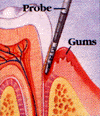 |
Gingivitis A mild inflammation of the gums caused by plaque buildup. Gums may be red and/or sore, and bleed upon probing. An anti-microbial mouth rinse may be prescribed. |
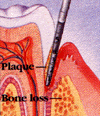 |
Periodontitis If left untreated, the gum infection damages the bone and supporting tissues. Your gum separates from the tooth and the bone level deteriorates. |
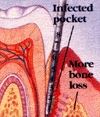 |
Advanced Periodontitis Your gums recede farther and separate. Pus may develop, bone loss continues, and your teeth may loosen or fall out. |
Treatments
Your dentist will examine you for periodontal disease during each routine checkup. A periodontal probe will be used to determine if there is any breakdown in the gum tissue attachment or if pockets have developed between your gums and teeth.
Treatment will depend upon the type of periodontal disease and how far the condition has progressed. Treatment options include:
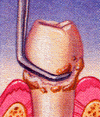 |
Scaling: cleans the teeth to remove deposits above and below the gumline. |
 |
Root Planing: smooths rough root surfaces so the gum can heal. Local anesthesia may be used. |
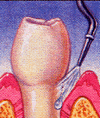 |
Oral Irrigation: directs anti-microbial (anti-plaque) liquid below the gumline to flush out and kill germs to allow the regeneration of healthy tissue. |
If deep pockets are found and bone has been destroyed, your dentist may recommend periodontal surgery.
A proper program of brushing, flossing, and regular professional cleanings will help fight plaque accumulation and gum disease, and help you keep your teeth for a lifetime.
Be sure to follow the special home care instructions provided by your dental professional.
